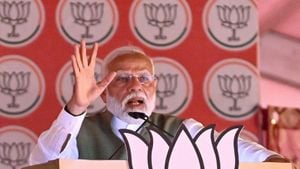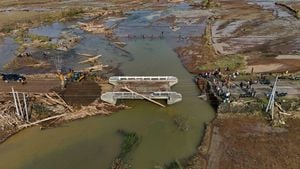Prime Minister Narendra Modi's recent visit to Jharkhand took an unexpected turn when his aircraft encountered technical difficulties, leading to significant delays and logistical adjustments. The incident occurred on November 14, 2024, as Modi was set to return to Delhi following his engagements related to the 150th birth anniversary of Birsa Munda, the revered tribal leader and freedom fighter. This unforeseen snag not only disrupted his schedule but also highlighted the operational challenges of managing VIP flights.
According to reports, Modi's plane, identified as a Boeing business jet operated by the Indian Air Force, developed the technical snag at the Deoghar airport. The Deputy Commissioner of Deoghar confirmed the aircraft was unable to fly, forcing the Prime Minister to wait for more than two hours as efforts to resolve the issue were underway. Unfortunately, the snag could not be fixed on site, prompting the need to arrange for another aircraft to facilitate his travel back to the capital.
A standby aircraft, also equipped for high-profile transport, was dispatched from Delhi to rescue the Prime Minister from this predicament. This alternative arrangement was executed swiftly, underscoring the importance of contingency plans when transporting high-ranking officials. The switch to another plane ensured Modi could continue with official duties with minimal interruption, though the delay was still notable.
Earlier on the day of the incident, Modi had been actively promoting tribal welfare. During his speech at an event held in Jamui district of Bihar, he unveiled various development projects worth Rs 6,640 crore aimed at improving infrastructure, education, and healthcare for the tribal communities. He emphasized his dedication to delivering justice to the tribal populations who have historically faced marginalization and neglect.
Modi's decision to celebrate Birsa Munda’s birth anniversary as 'Janjatiya Gaurav Divas' reflects his government's commitment to honoring the contributions of tribal communities to India's history and culture. The initiatives announced included foundational stones for numerous projects and the release of commemorative stamps and special coins, both serving to memorialize Munda's legacy. This kind of emphasis on developmental projects is not merely symbolic; it aims to provide tangible benefits to the targeted communities, aligning with Modi's broader vision for inclusive growth.
Despite the challenges faced with the aircraft, the Prime Minister's engagements suggest a determined approach to governance, focusing on substantial investment and policy outreach. This incident plays out against the backdrop of broader political campaigns, especially as India gears up for upcoming elections, where such public displays can significantly influence voter sentiments.
Air travel for dignitaries like the Prime Minister involves rigorous security measures and advanced logistical support. The recent events served as both a reminder of the intricacies involved and the importance of having efficient systems to mitigate the impact of unforeseen circumstances. Modi's swift transfer to another aircraft demonstrated the extent to which protocols are established, ensuring continuous connectivity and addressing emergencies, no matter how unexpected.
This incident underlines the pressing need for vigilance and readiness within governmental and aviation infrastructures, particularly as Prime Minister Modi continues to lead significant initiatives aimed at national development. From investment strategies to legislative reforms impacting everyday life, the government's agendas are ambitious, but they also highlight the necessity for adaptability.
While Modi's delayed return was not without its complications, it is expected to have little long-term repercussions on his government’s operations or the initiatives he pursues. The Prime Minister's priority remains focused on steering the country forward, encapsulating his administration's commitment to fostering growth, addressing inequality, and enhancing infrastructure nationally, even if marred by technical uncertainties.
Overall, Modi's foray this November is reflective of the dynamic nature of political leadership within the framework of operational management. The incident at Deoghar serves as significant, challenging expectations, prompting operational prompts, and reiteranting Modi's resolve to address the pressing needs of tribal communities.



